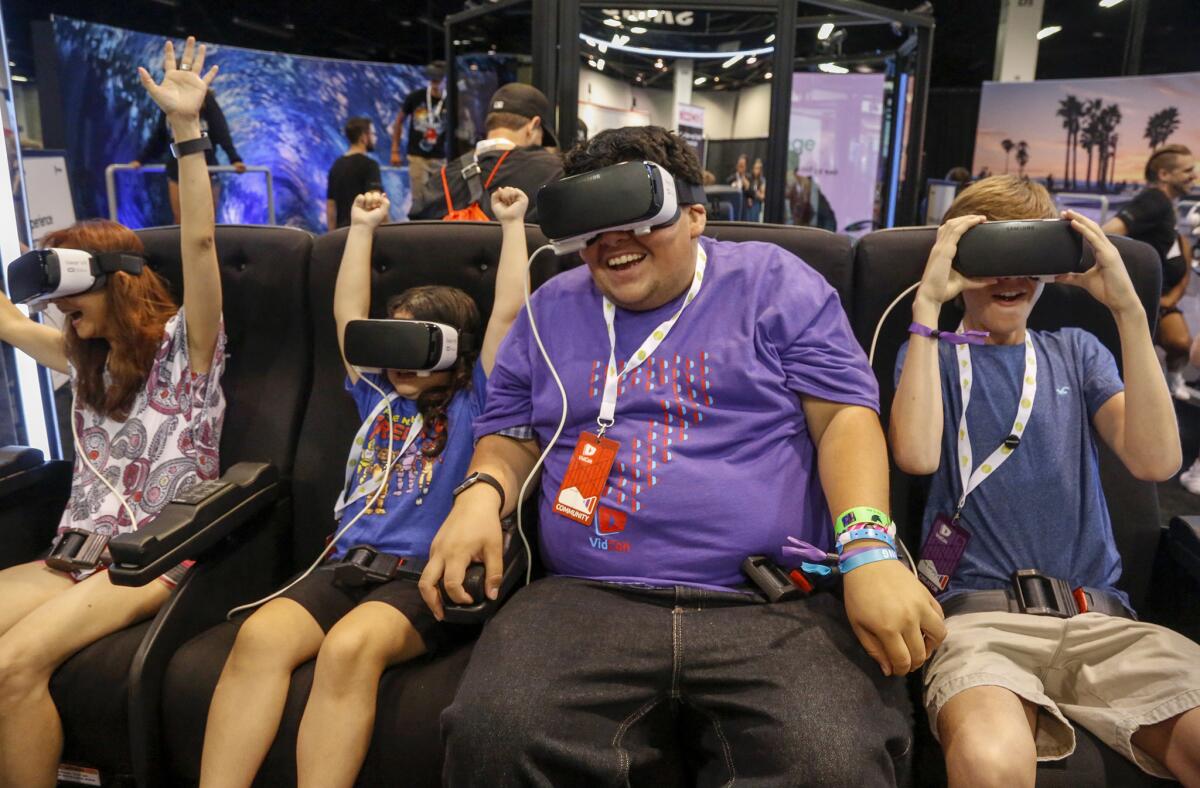Venture capital deals slow amid doubts about augmented reality’s reach

- Share via
Excluding an outlying $1-billion financing of Snapchat Inc., Los Angeles start-ups pulled in 57% less cash from venture capitalists in the second quarter compared with a year earlier.
The number of investments also dropped 42%, according to Dow Jones VentureSource data released Thursday.
Though steeper in the Los Angeles region, the decline in venture capital activity is reflected nationwide and continues a yearlong trend. Last summer, investors turned more cautious after realizing they were valuing start-ups too richly. At such prices, the companies could struggle to go public or find a buyer – especially at a time of global economic uncertainty.
But in recent weeks, venture capitalists have pointed to a second cause for the slowdown.
Many say they are placing fewer bets on tried-and-true smartphone apps, which had attracted more than $50 billion worldwide during a four-year period running through 2015. Apps for virtual and augmented reality devices could become an investment target. But fund managers are unsure about when the technologies will reach a critical mass. Amid that uncertainty, a deals shortage has emerged.
“For non-transactional stuff, mobile is dead,” General Catalyst Partners Managing Director Niko Bonatsos said, referring to shopping apps as one remaining opportunity. “We’re all trying to figure out what’s next in computing. Is it a new platform? Or new sectors?”
The void could have an outsized effect on Los Angeles, which sees most of its funding inflows go to consumer services companies.
The problem with mobile, venture capitalists say, is that people can spend only so much time on their phones.
“It feels like a zero-sum game,” said Max Motschwiller of Meritech Capital Partners.
Also of concern: Many of the best-known app-centric companies, including Uber, Instagram, Snapchat and WhatsApp, raised their first significant funding in 2011 or 2012. Not many breakouts since have maintained momentum. That could explain why data from research firm CB Insights show acquisitions, mergers and initial public offerings of mobile companies peaked a year ago.
More competition and thus less potential windfall don’t sound so golden to major investors.
“It’s hard to think with so many companies having tried and a few entrenched in our social fabric that someone else will emerge,” Motschwiller said. “These platforms get saturated from a distribution and competitive idea standpoint.”
Meanwhile, the type of accelerants that fueled the mobile boom haven’t come to virtual or augmented reality yet. Technology prices remain high. Finding new users and skilled workers is difficult.
Some early successes suggest that it’ll be smart to bet on augmented reality, which generally involves being able to overlay virtual objects onto someone’s field of view. Snapchat’s broadly adored Lens feature places dog ears, panda faces and other masks on images of people in real-time. The new game app “Pokemon Go,” which injects virtual critters into the real world, has gone viral in a week.
By “sprinkling a bit of 1990s nostalgia in there” with “Pokemon,” developers Niantic and Nintendo created a runaway hit after years of so-so experiences, said Cody Simms, executive director at Techstars, which provides mentorship and other services to start-ups.
Mergers and acquisitions advisor Digi-Capital estimates the augmented reality market will be worth $90 billion by 2020. But it could take until 2025 for the new technology to become as normal as the smartphone experience people have grown accustomed to over the last decade, according to a forecast issued this week by the firm.
“Despite the rapid growth potential, we are still talking about an early adopter ‘Tesla’ market for the next five years (think of how many Teslas you see in Menlo Park, Calif., compared to Lost Springs, Wyo.),” the report said.
On that kind of timeline, venture capitalists may yet hold off another year or two though Digi-Capital says they’ve put in at least $2 billion into augmented and virtual reality start-ups in the last year.
Other industries are picking up some of the slack, including transportation. Zoox, a start-up focused on self-driving vehicles, raised $200 million last quarter, one of the biggest investments in the nation. One of Los Angeles’ largest investments involved Hyperloop Technologies Inc., which took in $93 million to develop a high-speed tubed transit system.
Add those deals to massive investments in a handful of companies such as Snapchat and and ride-hailing app Uber Technologies Inc., and the top-line numbers continue to look stunning. There have been 10 straight quarters with more than $10 billion in venture capital put into start-ups.
But many entrepreneurs are being shut out. Quarterly investment into older start-ups was cut nearly in half to $7 billion from $12 billion last year. The tally of companies across the country raising venture capital for the first time has fallen in four straight quarters. And the number of software companies getting cash is on pace to slide 20% this year compared with last.
Twitter: @peard33
UPDATES:
5:00 p.m.: This article was updated to provide additional context about the augmented reality market.
This article was originally published at 3:53 p.m.




